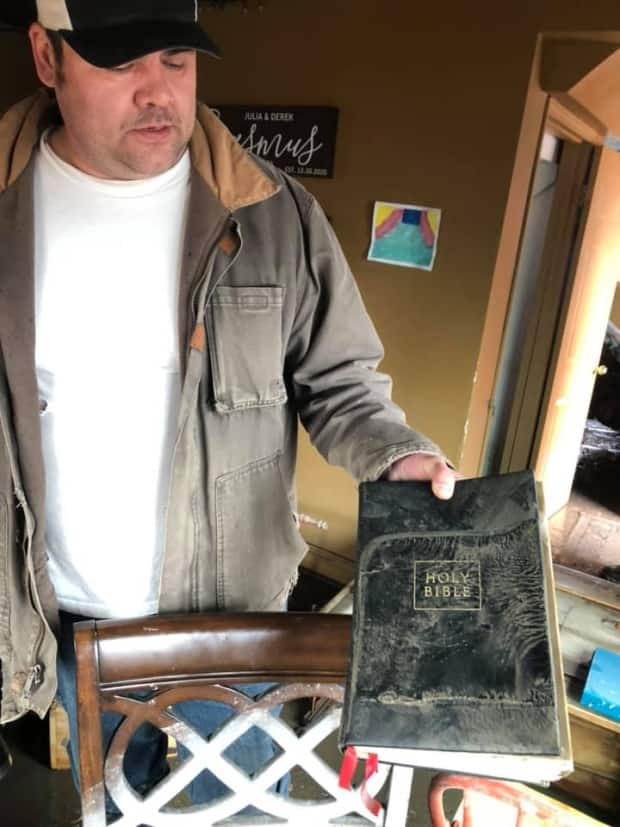'We still love it here': Fort Simpson man returns home

As flood waters receded, Derek Erasmus returned to his home in Fort Simpson to survey the damage — silt on nearly every surface, and items toppled blocking access to rooms.
When the water came up over the first floor, Erasmus was worried most about two items: his grandfather's bible, and his other grandfather's dry meat bag.
He inherited both items when they died, and those were the two things he was worried about as the floodwaters rose.
The bible was wet, but the dry meat bag unscathed.

'We still love it here'
An estimated 700 residents were forced to evacuate the community over a week ago when the Liard River broke, with some fleeing to Fort Smith, Hay River and Norman Wells. Flood waters have since receded, and community members have returned to assess the damage.
Erasmus's garage and rental unit filled with nearly a metre of water, soaking his tools and his wife's pottery studio.
Without insurance, rebuilding will be a considerable effort, he said.
"We'll have to clean it all out and repair everything. New flooring, drywall. I think we'll have to replace insulation," he said.
They'll have to relocate their mechanical room upstairs, in case the community ever floods like this again, he said.
Even though the Dehcho (Mackenzie River) is powerful, and though Erasmus has been flooded out before, he's not planning to move any time soon.
"We still love it here. It's nice to be by the river."
They've been staying with their parents on higher ground, and their young daughter has been upset by the flood.
The waters also displaced one of their renters and the revenue they get from a suite, which went underwater.
Walking through the house, Erasmus tells CBC the silt has affected an entire level of their house.
"Pretty dirty, lots of silt on the ground," he said.
'Everyone pulled together'

Erasmus says he and his neighbours are trying to remain positive.
"Everyone pulled together.… Everyone got fed, everyone got housed. It's been positive for the community to come together, especially [with] COVID-19… there's been no drum dances or feasts."
Erasmus said donations have come in from all over the North from businesses and individuals and "everyone is trying to help out the communities affected."
"People are bringing blankets down to tent city … someone makes a call out on Facebook 'We need this,' there's several people responding to help out," he said.
He says communities like Jean Marie River have seen people lose everything, and communities in the Sahtu and Beaufort Delta regions have yet to see the river rise like it did in the Dehcho region.
Erasmus says workers in Fort Simpson have been working tirelessly, for 20 hours a day over the last week, to get the community's infrastructure back in shape.
Erasmus said he doesn't have flood insurance, but he hopes the territorial government's emergency response will involve "stepping in to help affected homeowners out" with critical components like heat and water.
As he rebuilds, he'll be looking to invest in more flood-resistant materials in the event the flooding comes once again.

 Yahoo Movies
Yahoo Movies 